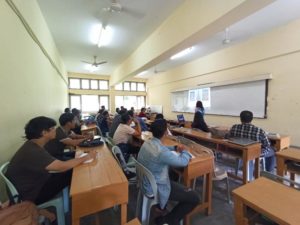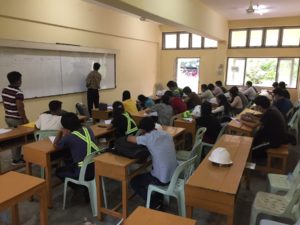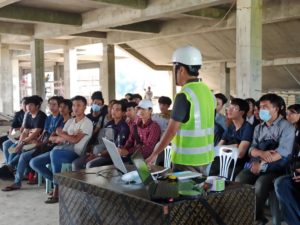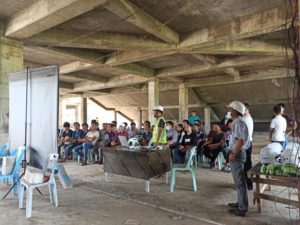
CSR
1. Code of Conduct
NEGC Co.,Ltd is referred to as “The Principal ” in the following. For the purposes of this Code of Conduct, the term “business partner” will mean any enterprise that provides the Principal with the final product or with materials or products used in the final product, that performs work or that provides services. This Code of Conduct should in no way be regarded as substitution or replacement of national or international laws or institutions but acts as a regulation imposed by the Principal.
1.1 Preamble
The Principal aims to maintain a standard of excellence in every aspect of the business, including legal, ethical and responsible conduct in all our operations. The Principal expects these commitments to be shared by all business partners that are affiliated with the manufacturing process for the Principal’s goods.
The principal commits itself to the basic principles of human rights, to respectfor human dignity as laid down in the International Bill of Human Rights (UNHDR, Civil and Social Covenant) and the Conventions of the International Labour Organization (ILO) and the basic principles of environmental protection. National legal regulations which are more stringent than this standard do apply in all cases.
1.2 General Obligations of Business Partners
1.2.1 Commitment
All business partners must sign the Code of Conduct as part of their contracts with the Principal. Suppliers must require the factories manufacturing on behalf of the Principal of accept the Code of Conduct. The Principal intends to cultivate a long-term relationship with the business partners.
1.2.2 Subcontracting
The principal’s business must not subcontract any portion of the manufacturing process without prior written approval from the Principal: this also includes home workers. As a condition for approval, subcontractors shall agree to comply with the Code of Conduct and need to disclose full name and address. The Principal reserves the right to control the subcontracting factory at any time either directly or via a nominated partner. All connected costs will be taken over by the business partner.
1.2.3 Information and Communication
Business partners must post the Code of Conduct, which is translated into the language of the worker, in a freely accessible location in all major workplaces and to the knowledge of all workers. The business partner must train workers on their rights and obligation as defined by this Code of Conduct and all applicable local laws.
1.2.4 Management and Reporting
Business partners must appoint persons who are responsible for the implementation and maintenance of the Code of Conduct and must name these persons as contact persons to the Principal, which must be able to report about their level of compliance with the Code of Conduct.
1.2.5 Legal Compliance
All business partners of the Principal shall comply fully with all national legal regulations, specifically labour and social laws. In addition all business partners shall obey the details of the Code of Conduct as it is based on the ILO Regulations, whichever is more stringent.
1.2.6 Transparency
The Principal’s business partners shall maintain complete and accurate records and information so that compliance can be effectively assessed. Factories are obliged to disclose all necessary documents to the Principal’s auditor. All business partners are obliged to give full information on the manufacturing sites for the Principal’s products, in other words the name and address of the factory that is manufacturing on behalf of the Principal.
1.2.7 Control
For the purpose of controlling performance and timely progress in development, the Principal or an authorized third party may perform an audit at any time and without prior notice.
The Principal will reserve the right to terminate business relations whenever serious breaches of business human right, willful violations of the standard, or systematic forgery and/or persistent lack of cooperation are found.
1.2.8 Development
It is expected that the factories fully cooperate during control visits and that they dedicate convincing efforts to the goal of improving their social performance, and rectify violations of the Code of Conduct.
1.3 Guide Principles for Factory Operations
1.3.1 Respectful Working Atmosphere
The business partners commit themselves to enabling decent working conditions for their workers. Any kind of corporal punishment, psychological, physical, sexual or verbal harassment and abuse, and any other form of intimidation is prohibited. Disciplinary measures in case of misconduct of workers are in line with national law and internationally recognized human rights, and are in no case degrading or involve inflicting monetary penalties. No arbitrary punishment is allowed in the case of a worker’s illness or pregnancy.
1.3.2 No Child Labour
According to the principles and recommendations listed in the Child Welfare International Agreement, the Principal acknowledge the right of each child to be protected against commercial exploitation and ensures that they are not development. Child labour is forbidden as defined by ILO an UN conventions and/or by national law. The Principal must refer to ILO conventions 138, 182 and ILO recommendations 146 & 190 which are following: Convention concerning Minimum Age for Admission to Employment (ILO 138) Convention concerning the Prohibition and Immediate Action for the Elimination of the Worst Forms of Child Labour (ILO 182) Recommendations concerning Minimum Age for Admission to Employment and Concerning the Prohibition (ILO 146)
Recommendation concerning Immediate Action for the Elimination of the Worst Forms of Child Labour (ILO Rec. 190)Regulations for the protection of young workers are followed and they are subjects to particular protection by the business partner. Children and young persons under 18 shall not be employed at night or in hazardous conditions and shall not work overtime.
1.3.3 Health and Safety at Work
The workplace must not harm worker’s health and safety. A safe and hygienic working environment is provided and has to maintained. Occupational health and safety practices and PPE are promoted and provided, which prevent accidents and injuries in the course of work or as a result of the use of employer facilities. Workers are trained on a regular basis to understand and follow the necessary protective and safety procedures, which include fire and evacuation drills: these must be done regularly and must be documented in a book of record.
Evacuation plans must be communicated to the workers: emergency exitsneed to be clearly indicated and their doors must open to the outside. Fire alarms must be controlled regularly. Staff members of each department must be trained in the basics of first aid. Fire extinguishers in working order and first aid material adapted to the risks must be made available on the premises. (ILO 155)
1.3.4 Legal Working Hours
Working hours are set and planned in accordance with local law and regulations. Workers will not more than 48 hours in a regular working week. Overtime only occurs occasionally, is voluntary, does not exceed 12 hours per week on regular basis and will be compensated. All workers will take and be granted at least 24 hours off after 6 consecutive days of work. (ILO 1)
1.3.5 Fair and Legal Compensation
Wages and benefits paid for a standard working week meet, at a minimum, national legal standards or industry benchmark standards, whichever is higher. In any event should always be enough to meet basic needs and to provide some discretionary income.
Deductions for wages as a disciplinary measure shall not be permitted, nor shall any deductions from wages not provided for by national law be permitted without the express permission of the worker concerned. All disciplinary measures should be recorded.
1.3.6 Legal Employment
Employment in the factory is based on a formal document such as a working contract or letter of appointment. This document details the terms and conditions of employment including wages, period of payment, benefits, leave entitlement and provisions for the termination of employment as defined by national law. All workers must be registered.All workers shall be provided with written and understandable Information about their employment conditions in respect to wages before they enter employment, and about the particulars of their wages for the pay period concerned each time that they are paid.
1.3.7 No Forced Labour
The Principal’s business partners must not use any type of force, bonded, compulsory or prison labour. Business partners must ensure that all employment is voluntary, and free from violence or threats. There shall be no restriction on movement or withholding of personal documents. No measures may be undertaken whereby workers are prevented from leaving the business partner or the production plant as laid out in their working contracts and in national law. Legally inadmissible disciplinary measures are prohibited. If the business partner uses external recruiting agents, the business partner shall pay all related fees.
1.3.8 Non-Discrimination
The Principal’s business partners must not discriminate in employment practices, including recruitment, hiring, compensations, training, benefits, advancement, termination or retirement, on the basis of race, colour, ancestry, national or social origin, religion, marital status, age, sexual orientation, gender identity or expression, disability, political opinion or any other personal characteristics or beliefs. Any distinctions in treatment, especially with regard to payment, are solely based on skills and working experience.
Pregnancy tests shall not be a condition of employment and shall not be demanded. Workers shall not be force or pressured to use contraception. If required by national law, the business partner must provide appropriate services to women workers in connection with pregnancy, childbirth and nursing. If the business partner allows women to bring their baby/child, a dedicated accommodation and adequate service needs to be provided as children are not allowed on the production floor.
Worker taking maternity leave shall be entitled to return to their employment under the same terms and conditions that applied prior to leaving. (ILO 100, 111, 183)
1.3.9 Freedom to Association
It is the right of workers to set up or join workers organizations of their choice (including unions) for collective bargaining.
If the right to freedom of association and collective bargaining is restricted by national law, workers shall be allowed to form bodies to represent their interest and to enter into direct dialogue with their employer (parallel means).
The business partner ensures that employee representatives have free access to all workplaces to carry out their representation functions and are not subject to discrimination.
(ILO 87, 98, 135, 154)
1.4 Environmental Standards in Production
Preserving the natural principle of life is fundamental, and is the basis for a successful economic activity in the future. The environment is to increasing global concern. Therefore the Principal expects its business partners to act responsibly in this respect.
Procedures for handling waste and chemicals, as well as other dangerous materials, emissions and effluent treatments must be in line with legal requirements.A material safety data sheet (MSDS) must be available in local language, and instruction in the MSDS must be followed. Chemicals must be safety stored and labeled properly. (ILO 170)
- Internship Program 2020
- Internship Program 2020
- Internship Program 2020
- Internship Program 2020
- Internship Program 2020




